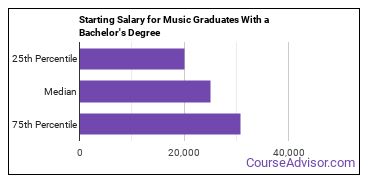Music
Featured schools near , edit
Types of Degrees Music Majors Are Getting
The following table lists how many music graduations there were in 2020-2021 for each degree level.
| Education Level | Number of Grads |
|---|---|
| Bachelor’s Degree | 15,362 |
| Master’s Degree | 5,778 |
| Associate Degree | 2,284 |
| Doctor’s Degree | 1,327 |
| Graduate Certificate | 570 |
| Basic Certificate | 421 |
| Undergraduate Certificate | 168 |
What Music Majors Need to Know
People with careers related to music were asked what knowledge areas, skills, and abilities were important for their jobs. They weighted these areas on a scale of 1 to 5 with 5 being the highest.
Knowledge Areas for Music Majors
This major prepares you for careers in which these knowledge areas are important:

- Fine Arts - Knowledge of the theory and techniques required to compose, produce, and perform works of music, dance, visual arts, drama, and sculpture.
- English Language - Knowledge of the structure and content of the English language including the meaning and spelling of words, rules of composition, and grammar.
- Education and Training - Knowledge of principles and methods for curriculum and training design, teaching and instruction for individuals and groups, and the measurement of training effects.
- Computers and Electronics - Knowledge of circuit boards, processors, chips, electronic equipment, and computer hardware and software, including applications and programming.
- Customer and Personal Service - Knowledge of principles and processes for providing customer and personal services. This includes customer needs assessment, meeting quality standards for services, and evaluation of customer satisfaction.
Skills for Music Majors
music majors are found most commonly in careers in which the following skills are important:

- Speaking - Talking to others to convey information effectively.
- Active Listening - Giving full attention to what other people are saying, taking time to understand the points being made, asking questions as appropriate, and not interrupting at inappropriate times.
- Critical Thinking - Using logic and reasoning to identify the strengths and weaknesses of alternative solutions, conclusions or approaches to problems.
- Reading Comprehension - Understanding written sentences and paragraphs in work related documents.
- Monitoring - Monitoring/Assessing performance of yourself, other individuals, or organizations to make improvements or take corrective action.
Abilities for Music Majors
A major in music will prepare for your careers in which the following abilities are important:

- Oral Expression - The ability to communicate information and ideas in speaking so others will understand.
- Oral Comprehension - The ability to listen to and understand information and ideas presented through spoken words and sentences.
- Speech Clarity - The ability to speak clearly so others can understand you.
- Speech Recognition - The ability to identify and understand the speech of another person.
- Near Vision - The ability to see details at close range (within a few feet of the observer).
What Can You Do With a Music Major?
Below is a list of occupations associated with music:
| Job Title | Job Growth Rate | Median Salary |
|---|---|---|
| Art, Drama, and Music Professors | 12.0% | $69,960 |
| Music Composers and Arrangers | 5.7% | $49,630 |
| Music Directors | 5.7% | $49,630 |
| Musicians, Instrumental | 6.0% | NA |
| Secondary School Teachers, Except Special and Career/Technical Education | 7.5% | $60,320 |
| Singers | 6.0% | NA |
| Sound Engineering Technicians | 6.5% | $52,390 |
Who Is Getting a Bachelor’s Degree in Music?
Racial-Ethnic Diversity
At the countrywide level, the racial-ethnic distribution of music majors is as follows:

| Race/Ethnicity | Number of Grads |
|---|---|
| Asian | 793 |
| Black or African American | 1,186 |
| Hispanic or Latino | 2,159 |
| White | 8,997 |
| International Students | 969 |
| Other Races/Ethnicities | 1,258 |
Geographic Diversity
Students from other countries are interested in Music, too. About 6.3% of those with this major are international students. The most popular countries for students from outside the country are:
- China
- South Korea
- Taiwan
- Canada
- Brazil
How Much Do Music Majors Make?
Bachelor’s Degree Starting Salary
The median starting salary of students who graduated in 2017-2019 with a bachelor’s degree in music was $24,982 per year. These stats come from the U.S. Department of Education. During this timeframe, most salaries fell between $20,155 (25th percentile) and $30,894 (75th percentile).

We don’t know for sure if all of these people took jobs related to music so take that into consideration.
Salaries According to BLS
Music majors often go into careers where salaries can range from $59,790 to $64,340 (25th to 75th percentile). This range includes all degree levels, so the salary for a person with just a bachelor’s degree may be a little less and the one for a person with an advanced degree may be a little more.
To put that into context, according to BLS data from the first quarter of 2020, the typical high school graduate makes between $30,000 and $57,900 a year (25th through 75th percentile). The average person with a bachelor’s degree (any field) makes between $45,600 and $99,000. Advanced degree holders make the most with salaries between $55,600 and $125,400.
Amount of Education Required for Careers Related to Music
Some degrees associated with music may require an advanced degree, while others may not even require a bachelor’s in the field. Whatever the case may be, pursuing more education usually means that more career options will be available to you.
How much schooling do you really need to compete in today’s job market? People currently working in careers related to music have obtained the following education levels.

| Education Level | Percentage of Workers |
|---|---|
| Less than a High School Diploma | 4.8% |
| High School Diploma - or the equivalent (for example, GED) | 8.8% |
| Post-Secondary Certificate - awarded for training completed after high school (for example, in agriculture or natural resources, computer services, personal or culinary services, engineering technologies, healthcare, construction trades, mechanic and repair technologies, or precision production) | 3.7% |
| Some College Courses | 7.5% |
| Associate’s Degree (or other 2-year degree) | 5.5% |
| Bachelor’s Degree | 27.1% |
| Post-Baccalaureate Certificate - awarded for completion of an organized program of study; designed for people who have completed a Baccalaureate degree but do not meet the requirements of academic degrees carrying the title of Master. | 3.0% |
| Master’s Degree | 22.7% |
| Post-Master’s Certificate - awarded for completion of an organized program of study; designed for people who have completed a Master’s degree but do not meet the requirements of academic degrees at the doctoral level. | 2.4% |
| First Professional Degree - awarded for completion of a program that: requires at least 2 years of college work before entrance into the program, includes a total of at least 6 academic years of work to complete, and provides all remaining academic requirements to begin practice in a profession. | 0.4% |
| Doctoral Degree | 13.9% |
| Post-Doctoral Training | 0.8% |
Online Music Programs
In the 2020-2021 academic year, 1,394 schools offered some type of music program. The following table lists the number of programs by degree level, along with how many schools offered online courses in the field.
| Degree Level | Colleges Offering Programs | Colleges Offering Online Classes |
|---|---|---|
| Certificate (Less Than 1 Year) | 0 | 0 |
| Certificate (1-2 years) | 70 | 2 |
| Certificate (2-4 Years) | 49 | 0 |
| Associate’s Degree | 379 | 10 |
| Bachelor’s Degree | 189 | 3 |
| Post-Baccalaureate | 0 | 0 |
| Master’s Degree | 766 | 19 |
| Post-Master’s | 72 | 0 |
| Doctor’s Degree (Research) | 229 | 1 |
| Doctor’s Degree (Professional Practice) | 9 | 0 |
| Doctor’s Degree (Other) | 14 | 0 |
Is a Degree in Music Worth It?
The median salary for a music grad is $63,500 per year. This is based on the weighted average of the most common careers associated with the major.
This is 59% more than the average salary for an individual holding a high school degree. This adds up to a gain of about $472,000 after 20 years!

Top Ranking Lists for Music
Explore Major by State
Alabama
California
District of Columbia
Idaho
Kansas
Maryland
Mississippi
Nevada
New York
Oklahoma
South Carolina
Utah
West Virginia
Alaska
Colorado
Florida
Illinois
Kentucky
Massachusetts
Missouri
New Hampshire
North Carolina
Oregon
South Dakota
Vermont
Wisconsin
Majors Related to Music
You may also be interested in one of the following majors related to music.
| Major | Number of Grads |
|---|---|
| Fine & Studio Arts | 37,413 |
| Design & Applied Arts | 36,301 |
| Drama & Theater Arts | 17,341 |
| Film, Video & Photographic Arts | 16,778 |
| General Visual & Performing Arts | 6,355 |
| Arts & Media Management | 4,788 |
| Dance | 3,288 |
| Other Visual Art | 912 |
| Crafts, Folk Art & Artisanry | 119 |
| Community/Environmental/Socially-Engaged Art | 10 |
References
*The racial-ethnic minorities count is calculated by taking the total number of students and subtracting white students, international students, and students whose race/ethnicity was unknown. This number is then divided by the total number of students at the school to obtain the racial-ethnic minorities percentage.
- College Factual
- College Scorecard
- National Center for Education Statistics
- O*NET Online
- U.S. Bureau of Labor Statistics
- Usual Weekly Earnings of Wage and Salary Workers First Quarter 2020
More about our data sources and methodologies.
Featured Schools
 Request Info
Request Info
|
Southern New Hampshire University You have goals. Southern New Hampshire University can help you get there. Whether you need a bachelor's degree to get into a career or want a master's degree to move up in your current career, SNHU has an online program for you. Find your degree from over 200 online programs. Learn More > |

